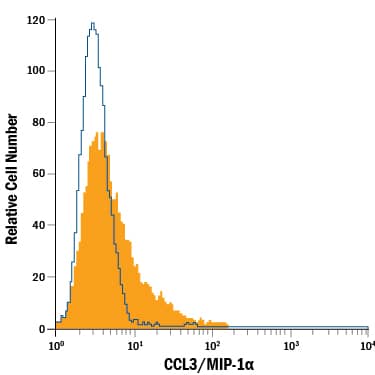Mouse CCL3/MIP-1 alpha Alexa Fluor® 488-conjugated Antibody
R&D Systems, part of Bio-Techne | Catalog # IC450G


Key Product Details
Species Reactivity
Validated:
Cited:
Applications
Validated:
Cited:
Label
Antibody Source
Product Specifications
Immunogen
Ala24-Ala92
Accession # P10855
Specificity
Clonality
Host
Isotype
Scientific Data Images for Mouse CCL3/MIP-1 alpha Alexa Fluor® 488-conjugated Antibody
Detection of CCL3/MIP‑1 alpha in RAW 264.7 Mouse Cell Line by Flow Cytometry.
RAW 264.7 mouse monocyte/macrophage cell line was stained with Rat Anti-Mouse CCL3/MIP-1a Alexa Fluor® 488-conjugated Monoclonal Antibody (Catalog # IC450G, filled histogram) or isotype control antibody (Catalog # IC006G, open histogram). To facilitate intracellular staining, cells were fixed with Flow Cytometry Fixation Buffer (Catalog # FC004) and permeabilized with Flow Cytometry Permeabilization/Wash Buffer I (Catalog # FC005). View our protocol for Staining Intracellular Molecules.Applications for Mouse CCL3/MIP-1 alpha Alexa Fluor® 488-conjugated Antibody
Intracellular Staining by Flow Cytometry
Sample: RAW 264.7 mouse monocyte/macrophage cell line fixed with Flow Cytometry Fixation Buffer (Catalog # FC004) and permeabilized with Flow Cytometry Permeabilization/Wash Buffer I (Catalog # FC005)
Formulation, Preparation, and Storage
Purification
Formulation
Shipping
Stability & Storage
- 12 months from date of receipt, 2 to 8 °C as supplied.
Background: CCL3/MIP-1 alpha
The macrophage inflammatory proteins 1 alpha and 1 beta, two closely related but distinct proteins, were originally co-purified from medium conditioned by a LPS-stimulated murine macrophage cell line. Mature mouse CCL3/MIP-1 alpha shares approximately 77% and 70% amino acid identity with human CCL3/MIP-1 alpha and mouse CCL4/MIP-1 beta, respectively. MIP‑1 proteins are expressed primarily in T cells, B cells, and monocytes after antigen or mitogen stimulation. The MIP‑1 proteins are members of the beta (C‑C) subfamily of chemokines.
Both CCL3 and CCL4 are monocyte chemoattractants in vitro. Additionally, the MIP‑1 proteins have been reported to have chemoattractant and adhesive effects on lymphocytes, with CCL3 and CCL4 preferentially attracting CD8+ and CD4+ T cells, respectively. CCL3 has also been shown to attract B cells as well as eosinophils. MIP‑1 proteins have been reported to have multiple effects on hematopoietic precursor cells, and CCL3 has been identified as a stem cell inhibitory factor that can inhibit the proliferation of hematopoietic stem cells in vitro as well as in vivo. In the same assays, CCL4 was reported to be much less active. The functional receptor for CCL3 has been identified as CCR1 and CCR5.
References
- Menten, P. et al. (2002) Cytokine Growth Factor Rev. 13:455.
Alternate Names
Entrez Gene IDs
Gene Symbol
UniProt
Additional CCL3/MIP-1 alpha Products
Product Specific Notices for Mouse CCL3/MIP-1 alpha Alexa Fluor® 488-conjugated Antibody
This product is provided under an agreement between Life Technologies Corporation and R&D Systems, Inc, and the manufacture, use, sale or import of this product is subject to one or more US patents and corresponding non-US equivalents, owned by Life Technologies Corporation and its affiliates. The purchase of this product conveys to the buyer the non-transferable right to use the purchased amount of the product and components of the product only in research conducted by the buyer (whether the buyer is an academic or for-profit entity). The sale of this product is expressly conditioned on the buyer not using the product or its components (1) in manufacturing; (2) to provide a service, information, or data to an unaffiliated third party for payment; (3) for therapeutic, diagnostic or prophylactic purposes; (4) to resell, sell, or otherwise transfer this product or its components to any third party, or for any other commercial purpose. Life Technologies Corporation will not assert a claim against the buyer of the infringement of the above patents based on the manufacture, use or sale of a commercial product developed in research by the buyer in which this product or its components was employed, provided that neither this product nor any of its components was used in the manufacture of such product. For information on purchasing a license to this product for purposes other than research, contact Life Technologies Corporation, Cell Analysis Business Unit, Business Development, 29851 Willow Creek Road, Eugene, OR 97402, Tel: (541) 465-8300. Fax: (541) 335-0354.
For research use only